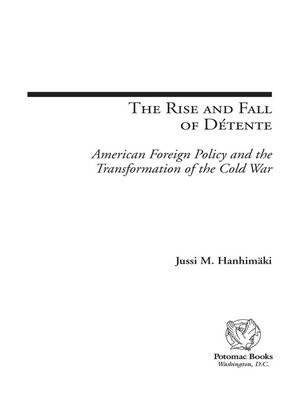The Rise and Fall of Détente
ebook ∣ American Foreign Policy and the Transformation of the Cold War
By Jussi M. Hanhimäki

Sign up to save your library
With an OverDrive account, you can save your favorite libraries for at-a-glance information about availability. Find out more about OverDrive accounts.
Find this title in Libby, the library reading app by OverDrive.



Search for a digital library with this title
Title found at these libraries:
| Library Name | Distance |
|---|---|
| Loading... |
In keeping with Robert J. McMahon's series Issues in the History of American Foreign Relations, Jussi M. Hanhimki offers students and scholars a survey of the evolution of American foreign policy during a key period in recent history, the era of superpower détente and global transformation in the 1960s and 1970s. Describing dtente as not only an era but also a strategy of waging the Cold War, the author examines the reasons that led to the rise of dtente, explores the highlights of the era's reduced East-West tensions, and explains the causes of dtente's demise.
Hanhimki addresses many questions: What were the long-term and short-term causes of détente? Was it a policy ""invented"" in the United States or adopted under pressure from abroad? Did it represent a radical break with the past—a move from idealism to realism—or was it simply an attempt to prolong the Cold War bipolarity within the international system? Was détente a policy that grew from weakness and doubt (caused particularly by the Vietnam War)? What were its main achievements and shortcomings? What led to its end? In conclusion, he evaluates the role of détente in the dismantling of the Cold War international system.







